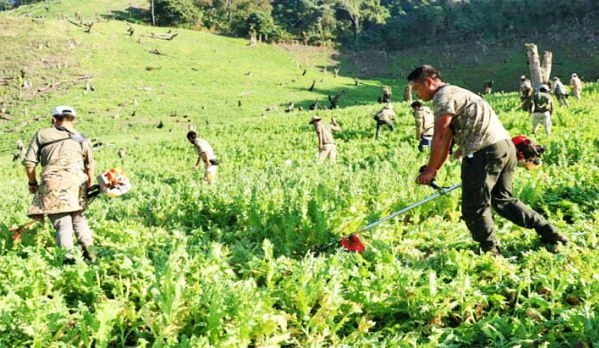The Manipur High Court’s judgement on tribal status for the state government to consider tribal ststus for the majority Meitis community may have been the immediate cause for the violence in Manipur in May 2023 since it revived old anxieties between the Meiteis and the hill tribes.
The judgement inflamed these tensions, and led to protests and clashes between the Meitei community and the hill tribes, which resulted in at least 73 deaths. The Supreme Court stepped in and stayed the Manipur High Court’s judgement, but the violence continued.
The Meitei community has long sought to be included in the Scheduled Tribes list, which would give them a number of benefits, including reservations in government jobs and educational institutions. However, the hill tribes have opposed this move, arguing that the Meiteis are not a tribal community and that their inclusion in the list would unfairly disadvantage them.
Underlying Factors
There are a number of reasons for the strife in Manipur today. Among them are political tensions, economic problems, drug trafficking, religious conversion and inter-tribal rivalry.
Manipur is a state with a long history of political instability. There are a number of different ethnic groups in the state, and there is often tension between them. This tension has been exacerbated by the fact that Manipur is a border state, and it is often caught up in the conflicts between India and its neighbors.
Manipur is a poor state, and there is a lot of poverty and unemployment. This has led to frustration and anger among the people, which has been exploited by some groups who are trying to incite violence.
Manipur is a major transit point for drug trafficking from Southeast Asia to India. This has led to the growth of drug addiction and crime in the state, which has further exacerbated the tensions.
Religious conversion is one of the factors. Manipur is predominantly Hindu. A number of groups in Manipur are opposed to Christianity and conversions in the state. These include some Hindu groups who argue that Christianity is a foreign religion that is incompatible with Manipuri culture, Meitei Inpi a socio-cultural organization that represents the Meitei community, and the United Naga Council, which represents the Naga people, the majority ethnic group in the hill districts of Manipur.
Tribal Rivalries
The rivalry between Kukis, Meiteis, and Nagas in Manipur is a complex and long-standing one. Land disputes, political and cultural differences have contributed to the rivalry. In 1992-1994, there was a major outbreak of violence between Kukis and Nagas that resulted in the deaths of hundreds of people. There have also been smaller-scale incidents of violence between the groups in recent years.
The Kukis, Meiteis, and Nagas all have competing claims to land in Manipur. This has led to conflict over land ownership and resources. They have different political goals. The Kukis want to create a separate Kuki state, the Meiteis want to maintain the status quo, and the Nagas want to create a greater Nagalim state that would include parts of Manipur, Nagaland, Assam, and Arunachal Pradesh.
The Kukis, Meiteis, and Nagas have different cultures and customs. This has led to misunderstandings and mistrust between the groups.
The Kuki people are an ethnic group native to Northeast India and Burma (Myanmar). They are one of the largest ethnic groups in Manipur, accounting for about 20% of the state’s population. They are believed to have migrated to the area from the Chin Hills of Burma in the 16th or 17th century. In the 18th century, the Kuki people were forced to flee their homes in Burma due to persecution. They migrated to Manipur and other parts of Northeast India. In the 1990s, there was a major conflict between Kukis and Nagas in Manipur. The conflict was caused by land disputes and political differences. The Kuki people have long demanded a separate Kuki state.
The Kukis were originally animists, but they were converted to Christianity by British missionaries in the 19th century.
In 1901, the Kuki population in Manipur was 150,000, accounting for about 25% of the state’s population. By 1941 it was 250,000, (30%). In 2011, it was 600,000 (20%) and by 2022 it was estimated to be around 750,000 (22%).
The Meitei population has also grown in the last 100 years, but not as significantly as the Kuki population, due to lower birth rate, out-migration of Meiteis to other parts of India and Conversion to Hinduism and Islam.
The Meitei population has remained at about 60% of the state’s population.
Drugs Trade
The cultivation of poppy is illegal in India, but poppy plant is a major source of income for many people in Manipur. The poppy plant is a key ingredient in the production of heroin. The drug trade in Manipur is controlled by a number of criminal gangs and mafias. These gangs are often armed and violent.
The drug trade has a number of negative impacts on the Manipur society. It has led to an increase in crime in Manipur and degradation of the social fabric in Manipur because drug addiction can lead to family breakdown, unemployment, and poverty.
Kuki militant groups, Rohingya refugees and Manipuri gangs are involved in the drug trade. Kuki militants are often forced into the drug trade by traffickers who offer them money or weapons in exchange for their involvement. Rohingya refugees are often forced into the drug trade by traffickers who take advantage of their vulnerability through threat of deportation. Manipuri gangs are often involved in the cultivation and production of poppy, as well as the trafficking of heroin.
The Manipur government has taken a number of steps to stop poppy cultivation and limit the drug trade in Manipur. These include law enforcement, social programmes and economic development.
In 2019, the Manipur Narcotics and Affairs of Border (NAB) department reported that 963 drug traffickers, including 768 men and 195 women, were detained under Narcotic Drugs and Psychotropic Substances (NDPS) Act. Law enforcement agencies have also destroyed large swathes of poppy cultivation. In 2020 and February 2021, law enforcement agencies destroyed 1,420 acres of poppy plantation.
In 2019, the Manipur government reported that the area under poppy cultivation had decreased by 20% compared to the previous year. However, the drug trade remains a serious problem in Manipur.
In 2021, the Manipur government rewarded total cash of Rs 10 lakh to a village in Ukhrul district for voluntarily destroying poppy plants grown in the village. In 2022, the Manipur government launched a “War on Drugs” campaign, which aims to destroy poppy cultivation and bring drug traffickers to justice. As of March 2023, the Manipur government has arrested over 2,500 people for drug-related offenses and has destroyed over 15,496 acres of poppy cultivation.
Religious Conversions
Manipur has a history of missionaries working for conversions since 1900. The first missionaries to arrive in Manipur were from the American Baptist Foreign Mission Society (ABFMS), who began their work in the state in 1894. The ABFMS missionaries were initially focused on providing education and medical care to the people of Manipur, but they soon began to evangelize as well.
In the early 1900s, the ABFMS missionaries were joined by missionaries from other Christian denominations, including the Church of England, the Salvation Army, and the Presbyterian Church. These missionaries also focused on education and medical care, but they were also more aggressive in their evangelism efforts.
As a result of the work of these missionaries, the number of Christians in Manipur grew steadily in the early 20th century. By the 1950s, Christians made up about 20% of the population of Manipur.
In the 1960s and 1970s, the number of conversions to Christianity in Manipur accelerated. This was due in part to the work of indigenous Christian leaders, who began to organize their own evangelistic campaigns. It was also due to the fact that the Indian government began to provide financial support to Christian missionary organizations.
In the 1970s, only about 30% of the population of Manipur was Christian. However, by 2011, this number had risen to 45%. This growth has been particularly rapid among the Meitei community, who are the majority ethnic group in Manipur.
The perceived threat that Christianity poses to the traditional culture and values of Manipur, has come to the fore in Manipur recently. Some people have accused missionaries of using coercion and financial inducement to convert people to Christianity, and this has led to anger and resentment among some Hindu groups.
In 2014, the Manipur government passed a law that made it illegal to convert people by force or inducement. However, the law has been criticized by some for being too vague and for not doing enough to protect religious freedom.
Peace Measures
The central government and the state government has taken a number of steps to bring normalcy in Manipur in the last two months. These include deploying additional security forces to help restore law and order, initiating dialogue with the Kuki and Meitei communities, providing relief to the affected people and launching a peace campaign
Comments
There is a need for greater understanding and dialogue between the different religious communities in the state, in order to find a way to live together peacefully and respectfully.
The drug trade in Manipur is a complex issue with no easy solutions. The drug trade has also damaged the social fabric of the state and has made it more difficult to address other problems, such as the conflict between Kuki and Naga groups.
In order to address the problem, it is important to address the root causes of the involvement of these groups, such as poverty, unemployment, and lack of opportunity.
It is important to take a comprehensive approach that includes law enforcement, social programs, and economic development. Law enforcement needs to be strengthened to crack down on the drug trade and to bring traffickers to justice. Social programs need to be implemented to help people who are addicted to drugs and to prevent people from becoming addicted in the first place. Economic development needs to be promoted to create jobs and opportunities for people, so that they do not feel the need to turn to crime or the drug trade to make a living.
The rivalry between Kukis, Meiteis, and Nagas is a serious problem that has had a negative impact on the state of Manipur. It has led to displacement, loss of life, and a general atmosphere of fear and mistrust. There is no easy solution to the rivalry, but it is important for the different groups to find ways to live together peacefully and respectfully.
The growing Kuki population has been a source of tension in Manipur. Some Meiteis have expressed concerns about the Kuki population growth, and there have been some incidents of violence between the two groups. However, it is important to note that the vast majority of Kukis and Meiteis live peacefully together.
The Indian government and the Manipur government have made some progress in bringing normalcy to Manipur. However, the situation remains tense, and there is a risk that violence could break out again. It is important for the two governments to continue their efforts to resolve the underlying tensions between the Kuki and Meitei communities.



















